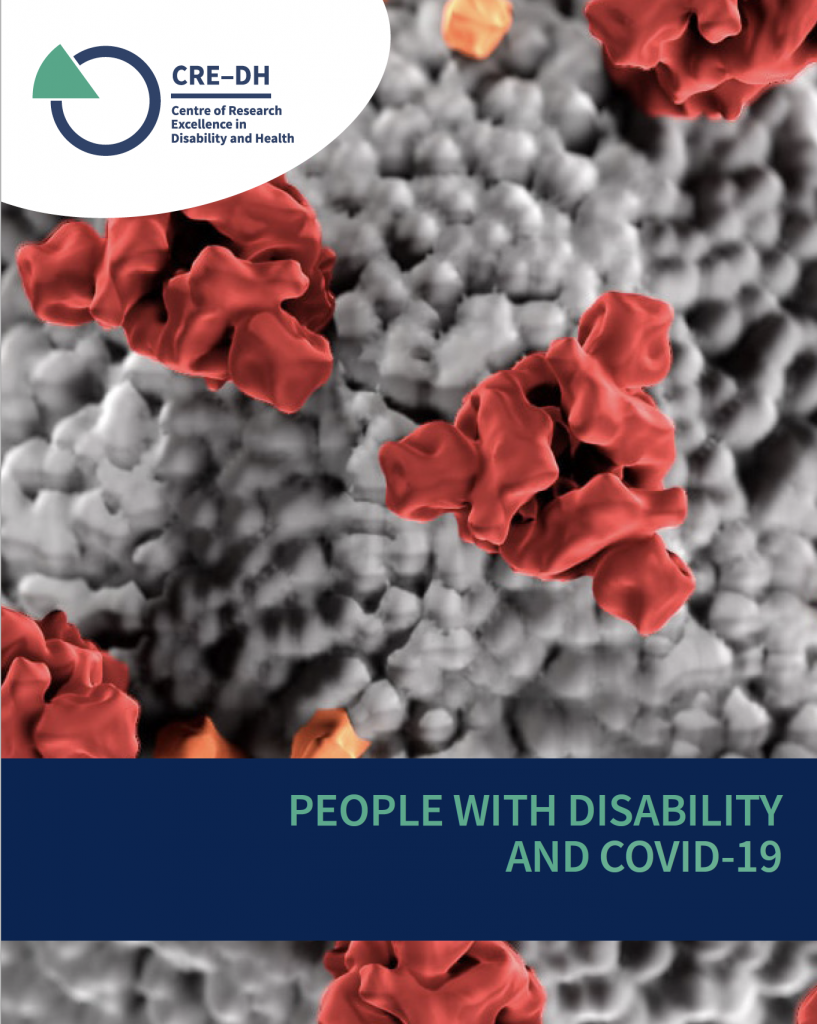COVID-19 and PEOPLE WITH DISABILITY in AUSTRALIA

COVID-19 STATEMENT#1 | 16 March 2020
Leading health and disability researchers are calling for urgent action from State and Federal governments to develop a targeted response to COVID-19 for people with disability, their families and the disability service sector.
A recent example in China where a 16-year-old boy died from starvation because his father was quarantined in hospital for COVID-19, suggests a number of measures can be implemented to reduce the likelihood of this happening in Australia. Although this is an extreme example there are also a number of other potential consequences that may emerge.
Context
Australians with disability are a vulnerable population in the COVID-19 pandemic because they are at elevated risk of morbidity and death due to underlying health conditions. This is frightening because:
- The health sector is under-prepared to meet the urgent health care needs of people with disability.
- The disability service sector will not be able to meet the care needs of people with disability.
Information on what to do is not easily accessible. For example, some people may not understand why there is disruption to their usual daily care routines.
The Government has a targeted response for the aged care sector, but not for the disability sector. Both sectors have many similarities including congregated settings, a precariously employed and inadequately trained care workforce, and families and carers who may face significant challenges meeting the care needs of people with disability in Australia.
We recommend that governments take immediate steps including:
Rapidly scale up the health care sector’s capacity to care for people with disabilities by:
- Ensuring all clinics providing testing and services related to COVID-19 are completely
accessible and that this is communicated clearly to people with disability and their carers. - Providing extra resources such as video conferencing and telephone consultations to
existing specialised medical services for people with disability. - Creating a dedicated hotline for people with disability, disability services and families.
- Ensuring sufficient support for people with disability with the most complex needs, particularly if quarantined
- Making information accessible (including Easy English, Auslan, large print, captioning in all community languages) and disseminating this information through disability services, advocacy bodies and the National Disability Insurance Agency.
2. Rapidly increase capacity of the disability care workforce to respond to the pandemic and its consequences. The government must ensure that disability services stay open otherwise the lives of people with disabilities are at risk. This can be done by:
- Rapid upskilling of disability care workforce in infection control.
- Developing standby capacity that will allow rapid recruitment and expansion of the disability workforce sector by drawing on students of allied health including occupational therapy, physiotherapy and social work.
- Increasing capacity to process Working with Children and Police checks so a new workforce can be mobilised quickly.
- Providing more financial resources to services so they can rapidly scale up their operations when there are closures to schools, day services and other programs. This could be done through the NDIA.
- Ensuring that services that provide specialist supports such as employment and therapy remain financially sustainable if they experience a downturn because their operations need to cease temporarily.
- Allowing the disability service sector, like the health and aged care sectors, to have priority access at no cost to personal protective equipment including masks, hand sanitisers etc.
- Ensuring the needs of people with disability who self-manage are met as they may find it harder to access new workers and to get access to personal protective equipment.
- Ensuring continuity of support for people with disability with the most complex needs.
- Providing strong local coordination, potentially through Local Area Coordinators, to triage disability services so that as workers become infected or are exposed to infection, the most critical services are staffed and kept open.
- Providing financial compensation from the NDIA for casual and self-employed disability workforce (an increasing component of the sector) who need to self-isolate to avoid them coming to work if sick placing people with disability at risk of infection.
- Compensating family and carers of people with disability who need to take time off work to care for their loved one. This could include paying family members for a strict time limited period for support provided during normal working hours.
- Developing a coordinated plan, implemented through the National Quality and Safeguards Commission, to address the potential for increased violence, abuse and neglect against people with disability because of social isolation and disruption of daily routines, particularly in congregated settings such as group homes.
- Providing emergency support to families who are caring for family members who have behaviours of concern that may pose a risk to the person with disability and/or family members.
- Liaising with Aboriginal and Torres Strait Islander advocacy groups and communities to ensure that their needs are met.
- Ensuring that people who have not yet transitioned to the NDIS and people with disability who do not qualify for the NDIS, but may be vulnerable to COVID-19, receive the services and the supports they need.
There is a need for action at the highest levels of government, across the National Disability Insurance Agency and National Quality and Safeguards Commission to prevent the deaths of people with disability in the coming weeks and months.
Professor Anne Kavanagh, Chair in Disability and Health and Academic Director of the Melbourne Disability Institute, University of Melbourne; Co-Director CRE-DH
Associate Professor Gemma Carey, Research Director, Centre for Social Impact, UNSW; Chief Investigator CRE-DH
Professor Helen Dickinson, Public Service Research, UNSW; Chief Investigator CRE-DH
Professor Gwynnyth Llewellyn, Centre of Disability Research and Policy, University of Sydney; Co-Director CRE-DH;
Professor Bruce Bonyhady, Director, Melbourne Disability Institute, University of Melbourne
Professor Julian Trollor, Chair, Intellectual Disability Mental Health and Head,
Department of Developmental Disability Neuropsychiatry, Professor, School of Psychiatry, UNSW Medicine
